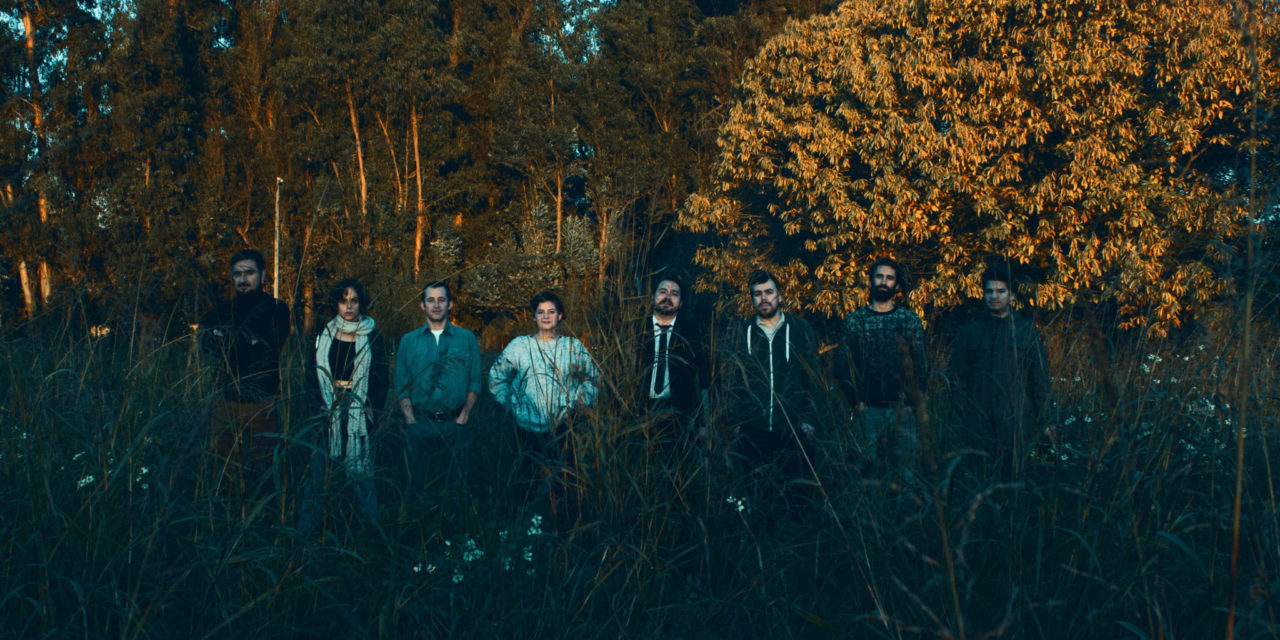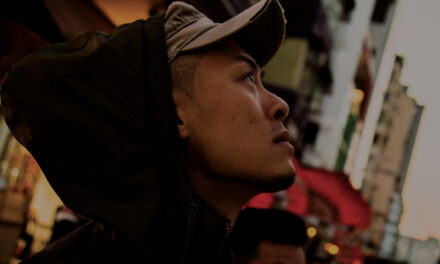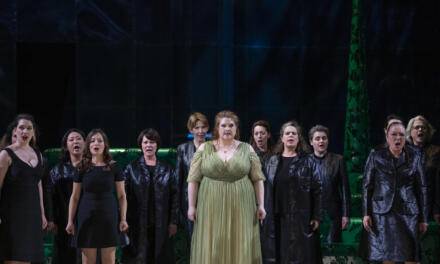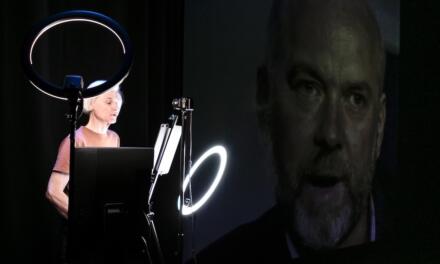On July 4th, 1999, almost 1700 low-income families in Peñalolén, Santiago de Chile illegally occupied 24 hectares of land, owned by businessman Miguel Nasur. Their aim was to settle down in this property, which sparked off a protracted conflict between the Chilean government, Mr. Nasur and the occupation leaders. After years of struggle involving politicians from all sides, the MINVU (in English, the Chilean Ministery of Housing and Town Planing) finally expropriated and bought the land for 12 billion pesos (roughly 18 million dollars) in 2005, putting an end to this long-term conflict. The families moved out of the land to newly built state-subsidized houses (known as “chubi” houses – in honor of a famous Chilean chocolate candy because of their colorful façades), and Mr. Nasur’s old property became one of the biggest parks in the area. This housing conflict was known as “la Toma de Peñalolén,” and lasted for almost seven years.
What people might be less familiar with regarding this dispute is that, in 2003, the Chilean government bought two plots in the Comunidad Ecológica, a protected and isolated territory in Peñalolén, close to the mountains, to built the first “chubi” houses. Their plan faced, however, strong opposition from The Comunidad Ecológica’s residents, mostly wealthy middle and high-class families. In 1999 they had bought the plots, settled in and since then created an isolated, eco-friendly, quiet environment, far from Santiago’s frantic activity. That is, until 2003. Of course, they weren’t against finding a solution to the housing problems of their fellow countryman. It’s just that they didn’t want them to settle in their own backyard, for it would diminish their own properties value, or just because their new neighbors wouldn’t fit in this simple, different way of living they were defending.
It was this particular episode of Chilean history that the Chilean-French theater company Colectivo Zoológico, based in Santiago de Chile, chose to perform for their next show, NIMBY (Not In My Backyard). This play is a co-production between the company and Theater und Orchester Heidelberg (TuOH) for the Adelante! Iberoamerikanisches Theaterestival, which starts in February 2017 in Heidelberg, Germany. After being contacted by the Goethe Institut in Santiago, which forwarded Heidelberg’s invitation, French director and stage designer Laurène Lemaitre and Chilean director Nicolás Espinoza, leaders of Colectivo Zoológico, accepted the challenge and began developing this co-production, which will then premiere in Chile in July 2017.
This young company, with six successful productions to its credit, functions more as a collective than a hierarchic theater company. Although Lemaitre and Espinoza serve both as directors and creative minds behind the whole operation, their collaborators also play a fundamental role during the artistic process. The permanent members of the collective, Viviana Nass, Germán Pinilla, José Manuel Aguirre, Paula Pavez, Pablo Mois and Juan Pablo Troncoso, play different roles, as actors, producers, technical staff and even playwrights. Everything and everyone is to serve a higher purpose, namely, the performance, as a place for political and critical thinking. The better part of their production is constituted by devised plays, based on dissimilar materials. From books by well-known sociologists to decree-laws from Pinochet’s government, Colectivo Zoológico assembles these elements to create a compelling dramaturgy, ultimately to establish a critical and productive dialogue with the audience.
NIMBY was not the exception to the rule. As a starting point, instead of recurring to an existing play, they decided to work with the idea of community. Yet, TuOH dramaturg Sonja Winkel, who accompanied the creative team throughout the process, persuaded them to narrow the idea down to a more precise concept. After careful thought, they found some research on the sociological phenomenon of Nimbyism (opposition by residents to a certain development proposal close to their home) applied to the Comunidad Ecológica’s conflict. The material they found was strong and had dramatic potential. All parties agreed. It was the starting point for NIMBY.
In September 2016, several members of TuOH traveled to Santiago (including two German actors, Nicole Ave ramps and Martin Wissner, Sonja Winkel and other staff members). The team had the chance to interview several people who were directly involved in the conflict. They managed to talk to a young man who lived in the Toma. One of most striking things he said, according to Espinoza, was that, after the dissolution of the Toma, he felt people seemed more individualist. The whole purpose that had brought them together as a community was gone. The Colectivo interviewed two leaders of the Comunidad Ecológica as well, as a way to have all points of view in hand before elaborating the final dramaturgy. At last, they met sociologist Eduardo Canteros, who had studied organized communities against development proposals in their neighborhoods. It was after this conversation play’s plot finally appeared.
NIMBY tel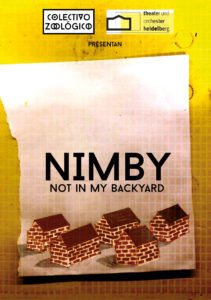 ls the story of two leaders of the Comunidad Ecológica (Nass and Aguirre) who hire two German experts (Averkamps and Wissner, impressively juggling with German and Spanish dialogues). Juan Pablo Troncoso, who tackled the task of writing the play as well, also performs some minor roles throughout the production. Pinilla serves as a security guard in the Comunidad. During the last trimester of 2016, Troncoso and the Colectivo simultaneously wrote and rehearsed the play. Winkel accompanied Troncoso, Lemaitre and Espinoza from Germany, reading different scenes and pitching in when necessary. Two weeks before Christmas, they submitted the final manuscript. Angela Calderón, a student from Heidelberg, was in charge of translating the play into German. During the last stage of the production, Colectivo Zoológico has moved into Heidelberg. From December 2016 to early February 2017 (the play premieres on February 12th), Chilean and German actors have been rehearsing non-stop.
ls the story of two leaders of the Comunidad Ecológica (Nass and Aguirre) who hire two German experts (Averkamps and Wissner, impressively juggling with German and Spanish dialogues). Juan Pablo Troncoso, who tackled the task of writing the play as well, also performs some minor roles throughout the production. Pinilla serves as a security guard in the Comunidad. During the last trimester of 2016, Troncoso and the Colectivo simultaneously wrote and rehearsed the play. Winkel accompanied Troncoso, Lemaitre and Espinoza from Germany, reading different scenes and pitching in when necessary. Two weeks before Christmas, they submitted the final manuscript. Angela Calderón, a student from Heidelberg, was in charge of translating the play into German. During the last stage of the production, Colectivo Zoológico has moved into Heidelberg. From December 2016 to early February 2017 (the play premieres on February 12th), Chilean and German actors have been rehearsing non-stop.
Today, less than a month before the premiere, the stage and costumes are ready, and so is the text. It is now the actors’ turn to embody those characters who represent so well, not only the Chilean society but Western culture in general. For even though NIMBY focuses on a specific Chilean friction, it would be naif to believe it doesn’t reflect on issues worldwide. Namely, the refugees’ conundrum that has been going on in Europe, particularly in France and Germany. Is there a significant difference between the Comunidad Ecológica leaders and residents in Calais, Northern France, who both ferociously oppose to the settlement of thousands of families who have nowhere else to go? How can the refugee crisis be solved if a group of European citizens challenges all efforts to find a peaceful solution? These are some of the universal issues Colectivo Zoológico’s NIMBY addresses. Not in a Manichean or limited way. Rather, in an attempt to provoke the audience, to trigger critical thought. As a way to go beyond the liberal position of politically correct and the predominant chauvinism. Probably nobody is against helping immigrants or refugees, at least publicly. It’s just that it’s easier to judge or solve conflicts when they’re not happening in your backyard.
This post was written by the author in their personal capacity.The opinions expressed in this article are the author’s own and do not reflect the view of The Theatre Times, their staff or collaborators.
This post was written by Andrea Pelegri Kristić.
The views expressed here belong to the author and do not necessarily reflect our views and opinions.

